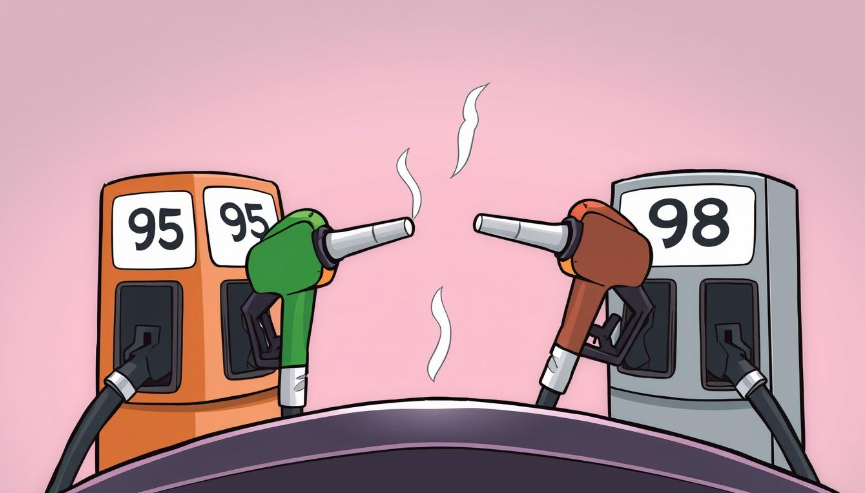As a car owner, you’ve probably seen 95 and 98 octane petrol at the pump. Wondering if you can mix these is common.
The answer is complex. Picking the right fuel affects your car’s performance and life, so it’s key to know about octane ratings.
Contents
Key Takeaways:
- Mixing 95 and 98 petrol is generally safe if the blend meets your car’s minimum octane requirements.
- Using higher octane fuel (98) in a car designed for lower octane (95) is safe but potentially costly.
- Using lower octane fuel (95) in a car requiring higher octane (98) can cause engine damage over time.
- Always check your vehicle’s manual for the recommended fuel grade.
- Accidental misfueling can be prevented by being vigilant at the pump.
Understanding Octane Ratings
Octane rating indicates a fuel’s ability to resist “knocking” or premature ignition in an engine. According to Science direct research Higher octane fuels are more stable under compression, making them suitable for high-performance engines.
| Fuel Grade | Octane Rating | Compatibility |
|---|---|---|
| Premium Unleaded | 95 RON | Suitable for most petrol engines |
| Super Unleaded | 98 RON | Recommended for high-performance vehicles |
| Blended (95 and 98) | ~96 RON | Suitable for most engines, meeting minimum octane requirements |
Using 98 Petrol in a 95-Octane Car
Using 98 octane fuel in a car designed for 95 octane is safe for the engine. The car’s computer can adjust to the higher-octane fuel. However, there are cost implications:
- Higher fuel costs without significant performance benefits
- Minimal impact on engine performance or fuel efficiency
- Potential slight improvements in fuel economy under heavy use
Using 95 Petrol in a 98-Octane Car
Using 95 octane fuel in a car requiring 98 octane can lead to several issues:
- Engine knocking due to premature ignition
- Reduced engine performance and fuel efficiency
- Potential long-term engine damage, especially to pistons and other crucial components
Guidelines for Mixing Fuel Grades
When mixing 95 and 98 petrol, follow these guidelines:
- Avoid mixing fuels with large octane differences.
- A 50/50 mix of 95 and 98 octane results in approximately 96.5 octane.
- Ensure the final blend meets your car’s minimum octane requirement.
- High-performance vehicles may require 98 octane or higher for optimal performance.
- Always consult your vehicle’s manual for specific fuel requirements.
Cost Implications of Higher Octane Fuels
Using higher octane fuel can impact your wallet:
- Premium 98 octane is typically more expensive than regular 95 octane.
- The price difference varies by region and fuel provider.
- For vehicles designed for 95 octane, the extra cost of 98 octane may not yield significant benefits.
Consider your vehicle’s needs and driving conditions when choosing between 95 and 98 octane to balance performance, fuel economy, and costs.
Preventing Accidental Misfueling
To avoid fuel mix-ups:
- Check your vehicle’s fuel requirements in the manual or fuel tank flap.
- Pay attention to the fuel pump and nozzle when refueling.
- Consider using fuels with distinct colors or dyes for visual differentiation.
- Be cautious when refueling unfamiliar vehicles.
- If you accidentally use the wrong fuel, don’t start the engine and seek professional help immediately.
Seeking Professional Advice
If you’re unsure about the right fuel for your car or experiencing fuel-related issues, consult:
- Your car’s manufacturer
- A trusted mechanic
- A fuel expert
Professional advice can help you understand octane ratings, the risks of using incorrect fuel, and how to maintain optimal engine performance.
Remember, proper fuel selection is crucial for your car’s longevity and performance. When in doubt, always err on the side of caution and seek expert guidance.

Hi, I’m Sufiyan, the developer behind this platform. I created FuelConsumptionCalculator.com to simplify fuel tracking for everyone — because understanding your vehicle shouldn’t require a degree in mechanics. I’m always working on adding more tools and content to make this site even more useful

